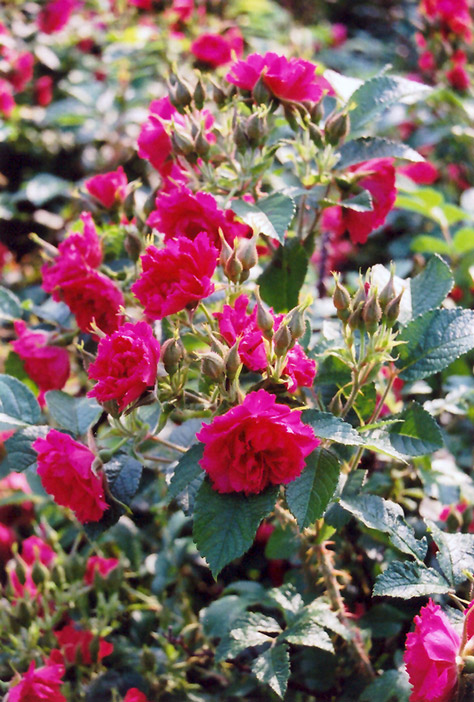F.J. Grootendorst Rose
Rosa rugosa 'F.J. Grootendorst'
Height: 5 feet
Spread: 4 feet
Sunlight:
![]()
Hardiness Zone: 3
Other Names: Saltspray Rose
Description:
An old-fashioned hardy shrub rose, featuring unusual frilly double bright red flowers all season long; bushy, upright habit, hardy and resistant to disease, highly regarded as one of the best; all roses need full sun and well-drained soil
Ornamental Features
F.J. Grootendorst Rose features showy lightly-scented red flowers with yellow eyes at the ends of the branches from late spring to late summer. The flowers are excellent for cutting. It has emerald green deciduous foliage. The glossy oval compound leaves turn an outstanding scarlet in the fall. The fruits are showy red hips displayed from mid to late fall. The spiny brick red bark adds an interesting dimension to the landscape.
Landscape Attributes
F.J. Grootendorst Rose is a multi-stemmed deciduous shrub with an upright spreading habit of growth. Its average texture blends into the landscape, but can be balanced by one or two finer or coarser trees or shrubs for an effective composition.
This is a high maintenance shrub that will require regular care and upkeep, and is best pruned in late winter once the threat of extreme cold has passed. Gardeners should be aware of the following characteristic(s) that may warrant special consideration;
- Disease
- Spiny
F.J. Grootendorst Rose is recommended for the following landscape applications;
- Accent
- Mass Planting
- Hedges/Screening
- General Garden Use
Planting & Growing
F.J. Grootendorst Rose will grow to be about 5 feet tall at maturity, with a spread of 4 feet. It tends to fill out right to the ground and therefore doesn't necessarily require facer plants in front, and is suitable for planting under power lines. It grows at a fast rate, and under ideal conditions can be expected to live for approximately 20 years.
This shrub should only be grown in full sunlight. It does best in average to evenly moist conditions, but will not tolerate standing water. It is not particular as to soil type or pH, and is able to handle environmental salt. It is somewhat tolerant of urban pollution. This is a selected variety of a species not originally from North America.

